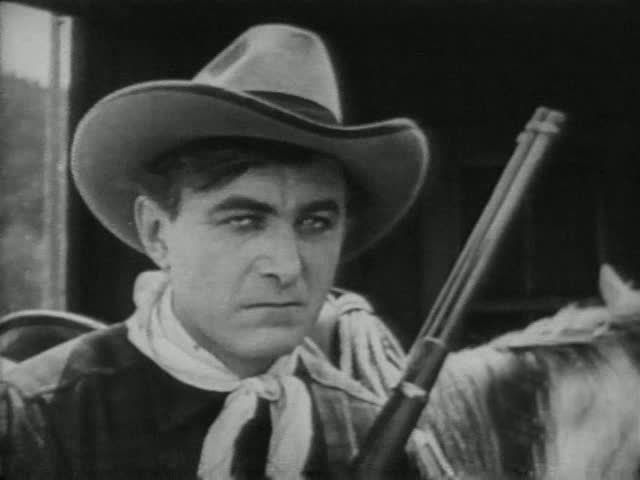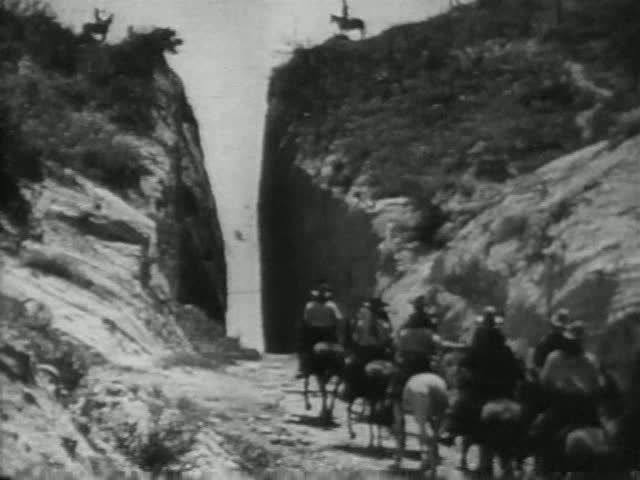
Straight Shooting was John Ford's first feature, and that's the primary reason this straightforward, even prosaic Western is still worth seeing. It's a solid, if rather unoriginal, hour-long Western actioner in which the villainous outlaw Thunder Flint (Duke Lee) steals the water rights to an area, trying to scare off the local farmers. When the stubborn old farmer Sweet Water Sims (George Berrell) refuses to give in to Flint, the outlaws kill Sims' son and send the vicious killer Cheyenne Harry (Harry Carey) to kill Sims as well. Instead, Harry, witnessing Sims and his daughter Joan (Molly Malone) grieving by the dead boy's fresh grave, abruptly decides to go straight and fight for the farmers.
This was one of many films Ford would make in his early years with Harry Carey, who with his craggy, eagle-like face and hooded, deep-set eyes, brings an intense, glowering presence to this film as the outlaw who redeems himself for the sake of a woman. Ford obviously recognizes these qualities in the actor — who fills the place John Wayne would someday come to occupy in the director's work — and gives Carey many striking closeups. Carey's at his best projecting raw anger, but he also gets some nice low-key comic moments here, like a scene in which he drunkenly lounges around a bar with some other outlaws, staggering and swaying as he shows off his toughness and his quickness with a gun.
There are some nice action set pieces here, notably a tense showdown on a deserted, dusty street, with Harry facing off against another man, both of them carrying rifles. The staging is inventive, drawing out the tension as the two men approach each other from opposite sides of the street, and then suddenly defusing the showdown for a moment as the men pass each other and face off from around the corners of a nearby shack instead. There are also some typically nice Fordian landscape shots, particularly of a location that appears several times, a narrow valley between two cliffs, often with riders standing watch atop the rocky outcroppings at the top of the frame.

The young Ford also does a good job with some scenes set on a rainy night in a small Western town, a dense downpour soaking the cowboys who wander into town and race immediately for the tavern. The film's plot is predictable and typical of countless Westerns from the same era, but even here, in this very basic and pedestrian Western, his first feature, Ford provides some interest. The action sequences towards the end of the film are satisfying, certainly, with a ragged quality to the scenes of the farmstead being besieged by outlaw riders, kicking up dust, framed between low-hanging trees and arcs of foliage that provide a proscenium for the action.
Throughout the film, there are several occurrences of the through-the-doorway shot that would become a Fordian trademark, made especially famous by its use in The Searchers. Notably, Ford uses the shots in similar ways even here, at the beginning of his career: the doorway's passageway between inside and outside becomes a resonant symbol for the transition from domesticity to wilderness, from the comforts of home and hearth to the dusty, lonely trails. It's always the family that's inside, while the outlaw or cowboy is outside, separated from them, and when the door closes on Ethan Edwards at the end of The Searchers, it's closing on any possibility of familial happiness for that irredeemable outcast. In Straight Shooting, Ford's hero still hadn't fallen that low, hadn't quite lost all hope of being able to step inside. This film hints at a similar ending to The Searchers, with the outlaw leaving the family behind after having done his work to save them, but ultimately there's a far more romantic resolution in store for him here. The Fordian hero, still young, not yet so set in his ways, could still be redeemed and step across the threshold.

2 comments:
Obviously the film has enormous historical significance, but aside from that it's heartening that Ford, unlike Hitchcock, actually began his career with films that for all their flaws are not only representative of a style that would later flourish, but also of a genre that this great director put his stamp on. That's not to say that Hitch is anything less than the very first rank (he's one of the very greatest artists in cinema history) but his early path was rockier than Ford's as you yourself have documented at ONLY THE CINEMA in a splendid series of reviews chronicling the early works. I haven't seen STRAIGHT SHOOTING yet, but your description of the engaging prosaic set pieces, Harry Carey and the early stages of the Fordian hero make it most appealing.
Very true about the comparison between Ford and Hitchcock, Sam. While Hitch struggled a little in his early years, making films that were very unlike his later classics, Ford started out making rougher, less mature versions of the classics he'd go on to make. Straight Shooting is nowhere near as complex or as great as later Ford, but it's recognizably his work and you can easily see how he got from this point to where he'd go next.
Post a Comment